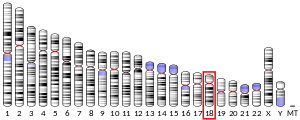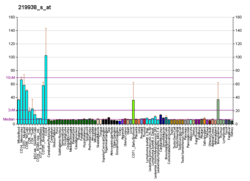| PSTPIP2 | |||||||||||||||||||||||||||||||||||||||||||||||||||
|---|---|---|---|---|---|---|---|---|---|---|---|---|---|---|---|---|---|---|---|---|---|---|---|---|---|---|---|---|---|---|---|---|---|---|---|---|---|---|---|---|---|---|---|---|---|---|---|---|---|---|---|
| Identifiers | |||||||||||||||||||||||||||||||||||||||||||||||||||
| Aliases | PSTPIP2, MAYP, proline-serine-threonine phosphatase interacting protein 2 | ||||||||||||||||||||||||||||||||||||||||||||||||||
| External IDs | OMIM: 616046; MGI: 1335088; HomoloGene: 69150; GeneCards: PSTPIP2; OMA:PSTPIP2 - orthologs | ||||||||||||||||||||||||||||||||||||||||||||||||||
| |||||||||||||||||||||||||||||||||||||||||||||||||||
| |||||||||||||||||||||||||||||||||||||||||||||||||||
| |||||||||||||||||||||||||||||||||||||||||||||||||||
| |||||||||||||||||||||||||||||||||||||||||||||||||||
| Wikidata | |||||||||||||||||||||||||||||||||||||||||||||||||||
| |||||||||||||||||||||||||||||||||||||||||||||||||||
Proline-serine-threonine phosphatase-interacting protein 2 is an enzyme that in humans is encoded by the PSTPIP2 gene. This protein, also known as macrophage F-actin-associated and tyrosine phosphorylated protein (MAYP) is a member of the Pombe Cdc15 homology (PCH) family of proteins has been shown to coordinate membrane and cytoskeletal dynamics
Function
Pstpip2 is selectively expressed in macrophages and macrophage precursors, and it is an actin bundling protein which regulates filopodia formation and macrophage motility
Cytokine expression profile
PSTPIP2 deficiency leads to elevated levels of circulating inflammatory mediators in vivo. In asymptomatic mice, only MIP-1α and IL-6 are elevated, however symptomatic PSTPIP2-deficient mice have elevated levels of circulating IL-6, MIP-1α, TNF-α, CSF-1 and IP-10 and decreased levels of IL-13
Disease linkage
The missense mutation I282N leads to a macrophage-mediated autoinflammatory disease called Lupo Pstpip2 (Pstpip2 ). It is characterized by skin necrosis, inflammation of paws, ears and inflammatory bone resorption. Another mutation in Pstpip2, L98P, was described in chronic multifocal osteomyelitis (cmo) mice. This disease is also autoinflammatory, and causes inflammatory infiltrate of polymorphonuclear leukocytes, macrophages, lymphocytes, plasma cells and osteoclasts. Later the infiltrate is replaced with new bone tissue which lead to tail kinks and hind-foot deformities. The cmo mice also develop ear inflammation in the epidermis, dermis and cartilage.
Interactions
PSTPIP2 interacts with protein tyrosine phosphatases from the proline-, glutamic acid-, serine- and threonine-rich (PEST) family, SHIP1 and Csk
References
- ^ GRCh38: Ensembl release 89: ENSG00000152229 – Ensembl, May 2017
- "Human PubMed Reference:". National Center for Biotechnology Information, U.S. National Library of Medicine.
- "Mouse PubMed Reference:". National Center for Biotechnology Information, U.S. National Library of Medicine.
- Wu Y, Dowbenko D, Lasky LA (November 1998). "PSTPIP 2, a second tyrosine phosphorylated, cytoskeletal-associated protein that binds a PEST-type protein-tyrosine phosphatase". The Journal of Biological Chemistry. 273 (46): 30487–96. doi:10.1074/jbc.273.46.30487. PMID 9804817.
- "Entrez Gene: PSTPIP2 proline-serine-threonine phosphatase interacting protein 2".
- Chitu V, Stanley ER (March 2007). "Pombe Cdc15 homology (PCH) proteins: coordinators of membrane-cytoskeletal interactions". Trends in Cell Biology. 17 (3): 145–56. doi:10.1016/j.tcb.2007.01.003. PMID 17296299.
- Yeung YG, Soldera S, Stanley ER (November 1998). "A novel macrophage actin-associated protein (MAYP) is tyrosine-phosphorylated following colony stimulating factor-1 stimulation". The Journal of Biological Chemistry. 273 (46): 30638–42. doi:10.1074/jbc.273.46.30638. PMID 9804836.
- ^ Grosse J, Chitu V, Marquardt A, Hanke P, Schmittwolf C, Zeitlmann L, Schropp P, Barth B, Yu P, Paffenholz R, Stumm G, Nehls M, Stanley ER (April 2006). "Mutation of mouse Mayp/Pstpip2 causes a macrophage autoinflammatory disease". Blood. 107 (8): 3350–8. doi:10.1182/blood-2005-09-3556. PMC 1895761. PMID 16397132.
- Chitu V, Pixley FJ, Macaluso F, Larson DR, Condeelis J, Yeung YG, Stanley ER (June 2005). "The PCH family member MAYP/PSTPIP2 directly regulates F-actin bundling and enhances filopodia formation and motility in macrophages". Molecular Biology of the Cell. 16 (6): 2947–59. doi:10.1091/mbc.e04-10-0914. PMC 1142438. PMID 15788569.
- Chitu V, Ferguson PJ, de Bruijn R, Schlueter AJ, Ochoa LA, Waldschmidt TJ, Yeung YG, Stanley ER (September 2009). "Primed innate immunity leads to autoinflammatory disease in PSTPIP2-deficient cmo mice". Blood. 114 (12): 2497–505. doi:10.1182/blood-2009-02-204925. PMC 2746474. PMID 19608749.
- Doherty TM, Kastelein R, Menon S, Andrade S, Coffman RL (December 1993). "Modulation of murine macrophage function by IL-13". J. Immunol. 151 (12): 7151–60. doi:10.4049/jimmunol.151.12.7151. PMID 7903102.
- Martinez FO, Sica A, Mantovani A, Locati M (January 2008). "Macrophage activation and polarization". Front. Biosci. 13 (13): 453–61. doi:10.2741/2692. PMID 17981560.
- Chitu V, Ferguson PJ, de Bruijn R, Schlueter AJ, Ochoa LA, Waldschmidt TJ, Yeung YG, Stanley ER (September 2009). "Primed innate immunity leads to autoinflammatory disease in PSTPIP2-deficient cmo mice". Blood. 114 (12): 2497–505. doi:10.1182/blood-2009-02-204925. PMC 2746474. PMID 19608749.
- Veillette A, Rhee I, Souza CM, Davidson D (March 2009). "PEST family phosphatases in immunity, autoimmunity, and autoinflammatory disorders". Immunological Reviews. 228 (1): 312–24. doi:10.1111/j.1600-065x.2008.00747.x. PMID 19290936. S2CID 30394426.
- Drobek A, Kralova J, Skopcova T, Kucova M, Novák P, Angelisová P, Otahal P, Alberich-Jorda M, Brdicka T (October 2015). "PSTPIP2, a Protein Associated with Autoinflammatory Disease, Interacts with Inhibitory Enzymes SHIP1 and Csk". Journal of Immunology. 195 (7): 3416–26. doi:10.4049/jimmunol.1401494. PMID 26304991.
Further reading
- Kimura K, Wakamatsu A, Suzuki Y, Ota T, Nishikawa T, Yamashita R, Yamamoto J, Sekine M, Tsuritani K, Wakaguri H, Ishii S, Sugiyama T, Saito K, Isono Y, Irie R, Kushida N, Yoneyama T, Otsuka R, Kanda K, Yokoi T, Kondo H, Wagatsuma M, Murakawa K, Ishida S, Ishibashi T, Takahashi-Fujii A, Tanase T, Nagai K, Kikuchi H, Nakai K, Isogai T, Sugano S (January 2006). "Diversification of transcriptional modulation: large-scale identification and characterization of putative alternative promoters of human genes". Genome Research. 16 (1): 55–65. doi:10.1101/gr.4039406. PMC 1356129. PMID 16344560.
- Rual JF, Venkatesan K, Hao T, Hirozane-Kishikawa T, Dricot A, Li N, Berriz GF, Gibbons FD, Dreze M, Ayivi-Guedehoussou N, Klitgord N, Simon C, Boxem M, Milstein S, Rosenberg J, Goldberg DS, Zhang LV, Wong SL, Franklin G, Li S, Albala JS, Lim J, Fraughton C, Llamosas E, Cevik S, Bex C, Lamesch P, Sikorski RS, Vandenhaute J, Zoghbi HY, Smolyar A, Bosak S, Sequerra R, Doucette-Stamm L, Cusick ME, Hill DE, Roth FP, Vidal M (October 2005). "Towards a proteome-scale map of the human protein-protein interaction network". Nature. 437 (7062): 1173–8. Bibcode:2005Natur.437.1173R. doi:10.1038/nature04209. PMID 16189514. S2CID 4427026.
- Pope SN, Lee IR (February 2005). "Yeast two-hybrid identification of prostatic proteins interacting with human sex hormone-binding globulin". The Journal of Steroid Biochemistry and Molecular Biology. 94 (1–3): 203–8. doi:10.1016/j.jsbmb.2005.01.007. PMID 15862967. S2CID 9746088.
- Suzuki Y, Yamashita R, Shirota M, Sakakibara Y, Chiba J, Mizushima-Sugano J, Nakai K, Sugano S (September 2004). "Sequence comparison of human and mouse genes reveals a homologous block structure in the promoter regions". Genome Research. 14 (9): 1711–8. doi:10.1101/gr.2435604. PMC 515316. PMID 15342556.
This article on a gene on human chromosome 18 is a stub. You can help Misplaced Pages by expanding it. |


